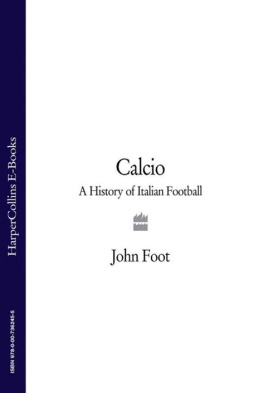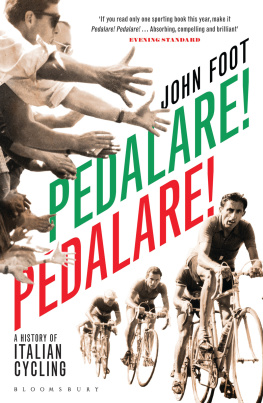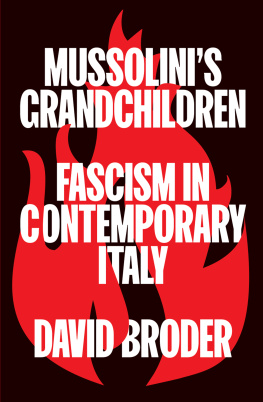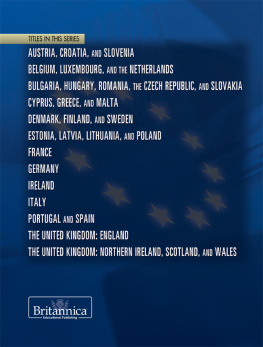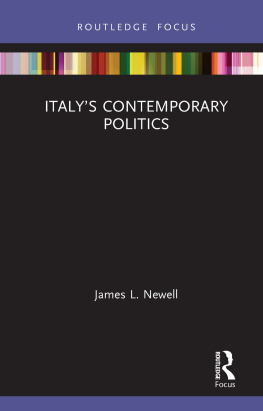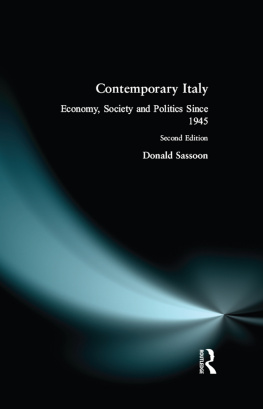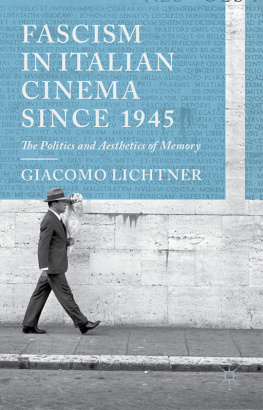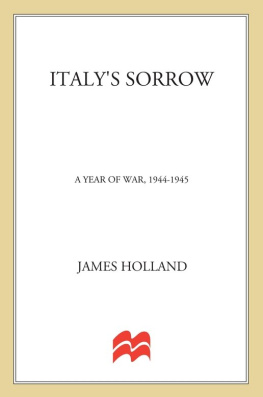THE ARCHIPELAGO
To Corinna
BY THE SAME AUTHOR
Milan since the Miracle: City, Culture and Identity
Calcio: A History of Italian Football
Italys Divided Memory
Pedalare! Pedalare!: A History of Italian Cycling
Modern Italy
The Man Who Closed the Asylums: Franco Basaglia and the Revolution in Mental Health Care

Contents

My great-grandmother, Aurelia Lanzoni, was Italian. She met her husband, a Scotsman called Arthur Tod, in Mesopotamia (now Iraq) in 1907. She spent much of her early life in the Ottoman Empire. There is a family photograph of her holding me as a tiny baby in her arms. She died in Edinburgh in 1965. In 1987 I decided to do a PhD at Cambridge. The subject was to be twentieth-century Italy, although I wasnt sure exactly what I was going to study. My supervisor advised me to go to Milan. My first trip there was to stay with old friends of his in the former industrial neighbourhood of Sesto San Giovanni, on the northern edge of the city. This was my first experience of the great generosity of Italians and their willingness to talk about their own history (or even just to talk!). I also made the mistake of drinking an espresso after dinner, and spent a sleepless night as a consequence. It was as if I had imbibed pure electricity.
I returned in 1988 to start work on my thesis on the First World War and its aftermath in Milan. I quickly began to learn Italian, mainly through listening to people talk, and reading. My stamping grounds were the beautiful libraries and archives of Milan, with their frescoes and comfortable wooden chairs. As I read about the Great War and fascism, I took in the city I was living in: its flatness, its mass of concrete, its hidden beauty. This was a place that was full of factories, but many of them were closed. It was also exotic, and glamorous. Another natural home was the stunning San Siro stadium, and its fervent fans. I would stay in Milan for more than twenty years, regularly commuting back to London to teach. During that time I grew to love Milan, and Italy. I had been seduced by what the journalist Luigi Barzini called Italys fatal charm.
It was an extraordinary time to live there, with political upheavals, World Cup victories (and defeats), mass immigration, and epochal transformations in society, politics and the cultural world. This book is the product of that double-decade, and of twenty years of teaching, reading and writing about Italy; it is the work of both an insider and outsider. I look at Italy both with the worldview of a non-Italian and also as someone with deep connections to Italian culture through residence, family, new and old friends, and twenty years of trying to understand the vicissitudes of il bel paese. My son Lorenzo was born in Milan in 1993. I also saw Italy through him, the schools he attended and his way of seeing things.
When historians attempt to write about this country, they often employ a master-theme or connecting thread to make sense of things. This could be the role of the family, or the relationship between citizens and the state, or the attempt to create Italians. This book has no such master-theme running through it. Thus, The Archipelago, a title that conjures up an image of a group of islands, uses stories, court cases, sporting events and biographies to paint a picture of a country. I see these fragments as a virtue, as the only way I could construct a history of modern Italy and communicate this to my readers.
Nonetheless, certain ideas and tropes do recur throughout this book. One is the idea of a divided country, fractured over its past and its present (as well as over a vision of its future). These divisions were both long term and short term, some reaching back to the very formation of the nation itself in the nineteenth century, others to fascism and the world wars fought in the twentieth century. There were also deep fractures between the north and the south, and the city and the countryside. Italians were divided over how to modernise Italy, or even whether it needed modernising at all.
Italy matters, and not just for Italians. Far from being at the margins of Europe, as is often claimed, it has always been at the centre of political innovation and change. Fascism originated in Italy after the First World War, and the country produced one of the most powerful and effective resistance movements against fascism in the 1940s. It drew up a post-war constitution that some see as one of the most elegant and carefully constructed in the world. Its post-war system has seen stunning and innovative developments in the political, economic and social spheres. This is a country from which we have much to learn, nel bene e nel male, as Italians say. Writing this book has been a journey into Italys past, but also into, perhaps, our own futures. Some lessons are there, I hope, in the pages that follow.
Italian history has often been thought about as a series of things that arent there as a kind of wish list of what Italy doesnt have. As John Agnew has argued, The image of a backward Italy struggling (somehow) with modernity is a dominant representation of the country in the eyes of both Italian and foreign commentators. Entire studies have argued that the nation should never have been born, that it is an historical mistake. The Archipelago rejects this way of seeing Italy. This is a history of real Italy: of what is actually there.
The Archipelago is an eclectic history, linked to my own preferences, experiences and passions. It is aimed at those who want to find out more, not at experts. It has been said that Italian history has been marked by short revolutions, and long counter-revolutions. At times since 1945 Italy has appeared to be on fast-forward, rushing towards the future, and at others it has almost seemed to stop altogether, or go backwards. It is also true that it is often individuals who change the course of history. Ordinary Italians changed their own country: a woman refusing to marry despite the pressures of convention and society, a psychiatrist saying no to practices of repression and dehumanisation, a magistrate not bowing to political pressure, a priest determined to give even the poorest of children a decent education, a film-maker trying to create beauty from the chaos of war. These stories help us understand Italy, and its struggles over how to shape the lives of its people since 1945.
How much of ourselves had been eroded, extinguished?
Primo Levi
The night must pass.
Eduardo De Filippo
Nobody can deny the fact that in this world torn apart by war there is trepidation now, more than ever before, about the life that will be born from so much death.
Concetto Marchesi, April 1945
April 1945: much of Italy lay in ruins. The Nazi occupiers had been driven out, but the legacy of five years of war was everywhere. Other foreign powers, the Allies, who many viewed as liberators, were still around, despite the fact that the war was over. Some cities had been flattened, others were reduced to a primitive state. People lived off scraps in the street. Across the world, Italians were struggling to return home. Some had been part of defeated fascist forces, others had been deported on racial or political grounds, or for refusing to carry on fighting. Many failed to make it. A good few took months or even years to return, emaciated and unrecognisable, often presumed dead. On arrival, they found a country on its knees, lacerated by violence and an unprecedented crime wave. Basic institutions were on the verge of collapse. Prisons were not just lacking in locks: they had no doors. It wasnt even clear where authority lay. Who was in charge, after all? King Vittorio Emanuele III, the Allies, the anti-fascist partisans?


